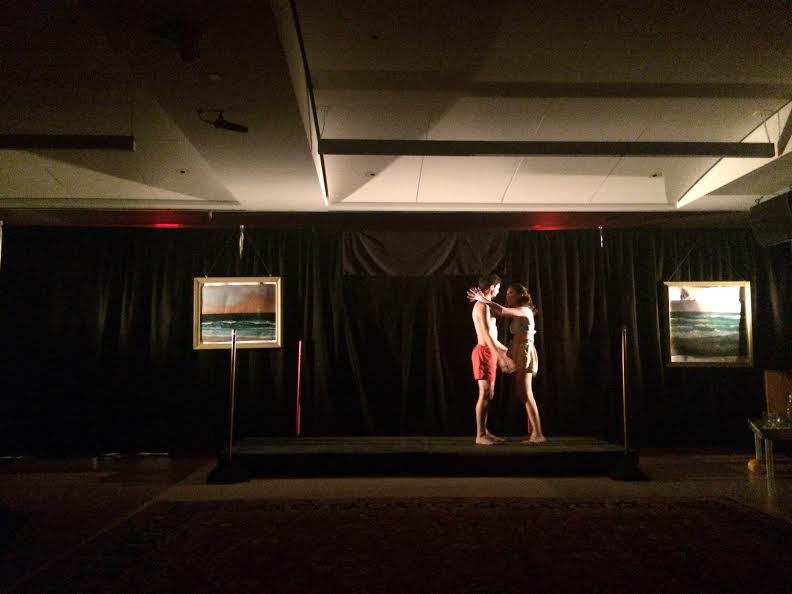Review of The King’s Players’ fall production, "Eurydice"
A chorus of three stones, a lord of the underworld dressed as a six-year-old in a propeller hat and an elevator to Hades that rains—these things and more make The King’s Players’ adaptation of Eurydice, a modern retelling by playwright Sarah Ruhl of the Greek myth of Orpheus, an enjoyable experience. Thematically, the play is a weighty one. We would expect a story about death and the afterlife to be emotionally taxing. However, Ruhl wrote young, energetic characters into an underworld that reminds the audience more of Alice and Wonderland than the Inferno. The King’s Players' director, Bryan Hunt, who returned after directing TKC alumnus, Grant DeArmitt’s Watson: The Musical, and this cast of eight actors should be commended for bringing us such a delightful production.
The three-quarter thrust stage caused the audience to feel a closeness to the actors and their goings-on without the actors having to break the fourth wall. Junior, Colton Knoepfle’s set design was innovative, complete with an elevator whose golden doors opened to reveal showers (of rice) raining down on Eurydice, played by Carrie Orteza (’18), and later Orpheus, played by Matthew Contreras (’17).
Another highlight of the play was junior, Benjamin Capitano’s original score. Capitano sat on a raised platform at stage left as a character with an omniscient point of view and a narrative voice of his own as he played his electric cello and music box. Capitano’s hand-made music box played the tune of Orpheus’ love song, “a symphony of twelve instruments,” to Eurydice after her death—it, along with his other musical themes, was crucial to the play, especially since the tale of Orpheus, a musician and poet, cannot be told without this form of art.
The music, along with the chorus of stones, Rachel Kyle ('16), Hope Epperson ('17) and Dagmar Wetherill ('15) took on the roles of interpreters of the play with cues that told the audience what exactly was happening and how the audience was supposed to feel about it. Words sounded like poetry and music in the underworld, where the language is “the language of dead people,” so words at face value do not always make sense. Navigating these language barriers, Eurydice’s father, Taylor Pope (’15), whom she meets again in Hades, explains the idea of fatherhood to her through the analogy of a tree. He tries to tell her about names, since the River Styx makes people forget, saying, “I heard your name inside the rain—somewhere between the drops—I saw falling letters.”
The stones also had lines that they chanted as musical poetry. They spoke in unison and seemed to have arranged their lines to sound like music with different tonalities and dissonance. And the stones made everyone laugh, a lot. They were charming, at times sweet and at other times impish. Wetherill, as the Big Stone, had a New Jersey accent that was especially humorous.
While I did not get a real sense of foreboding from the Nasty Interesting Man, Zachary Owens (’18) had perfect comedic timing as the lord of the underworld. From his entrance onstage pushing a Razor scooter, to his temper tantrum outbursts, Owens did everything right.
Pope was another standout comedian. His bits with the envelope-licking and the page flipping had the audience in stitches, and yet we hung on every word of his letter to Eurydice before her wedding day as it turned to a more somber note. Contreras also gave an earnest performance when he read his love letters to Eurydice, promising to rescue her from the dead.
Orteza and Contreras captured the innocence and childlike wonder of the world that characterizes Ruhl’s Eurydice and Orpheus. Orteza was especially energetic and wide-eyed, as she bounced around in her tulle wedding dress, designed by Kayla Redd ('16). She displayed the same sense of physical comedy and timing as her fellow actors.
Orteza’s performance would have benefited from a deeper understanding and savoring of Eurydice’s poetic language, with especially beautiful lines like, “A wedding is for fathers and daughters. They stop being married to each other on that day.” It also would have been compelling to see more contours of the relationship between Eurydice and Orpheus and to witness the nuanced dynamics between them as they change and grow over the course of the play.
Overall, what the Players did with Eurydice was humorous, clever and beautiful, and I hope everyone who had the chance to see it enjoyed it as much as I did.



